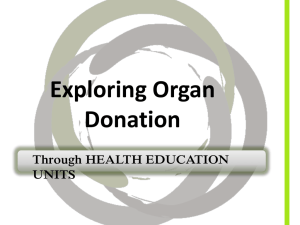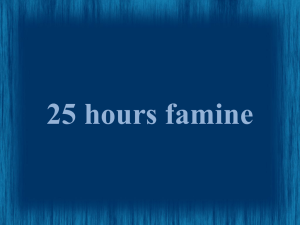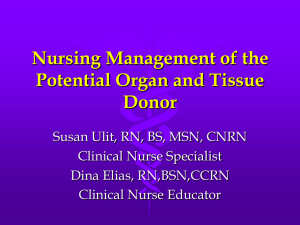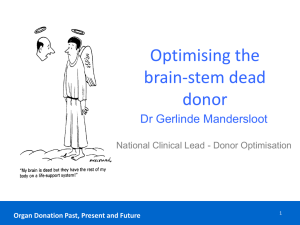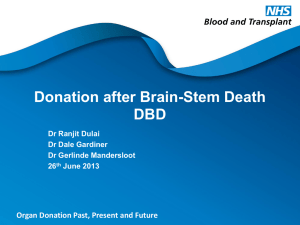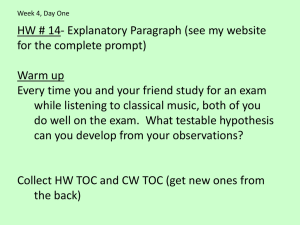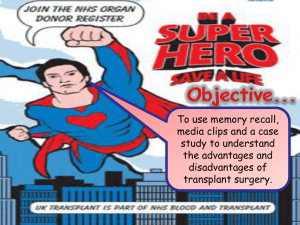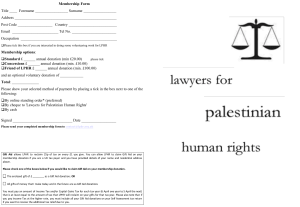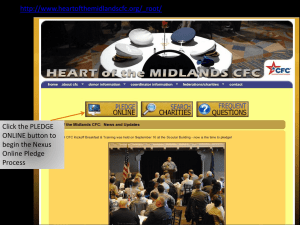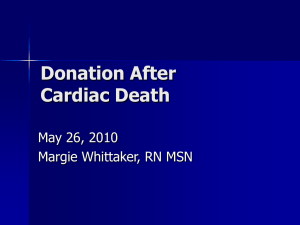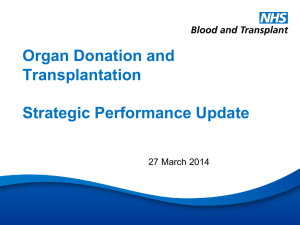Powerpoint - the Organ Donation New Zealand website
advertisement
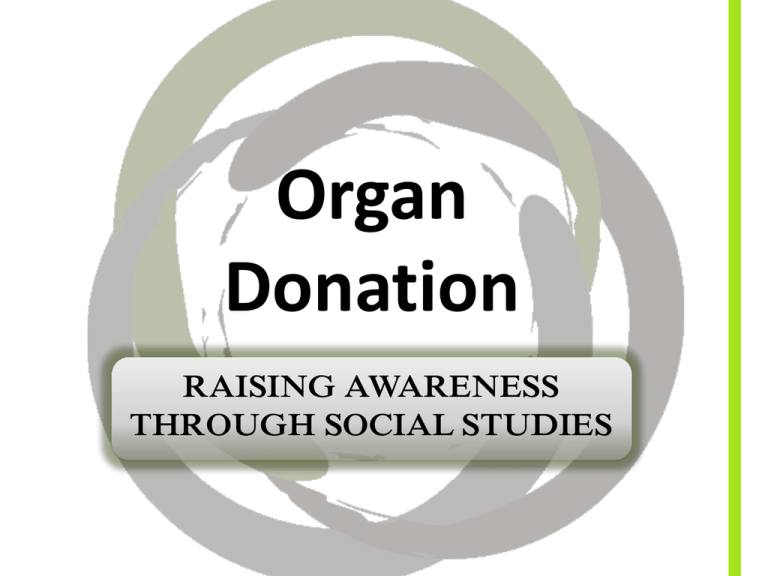
Organ Donation RAISING AWARENESS THROUGH SOCIAL STUDIES If you were in an accident and your family members were asked if they would consent to donate your organs, would they know your wishes? Alternatively, if it was a close family member, do you know their wishes or feelings about organ donation? They indicated that they wanted to be a donor on their licence, but that was almost 10 years ago – have they changed their mind? Did you know that your family – not you – are the ones who would make this final decision about your organs? Even though you may have ticked the box on your licence, this is an indication only, not a legal consent that doctors would act on. Encouraging people to talk about their views on organ donation with friends and family is a real focus for Organ Donation New Zealand. So with this in mind, they now have fully resourced teaching units available to teachers through their website www.donor.co.nz WHO?… ORGAN DONATION NZ Organ Donation New Zealand (ODNZ) is New Zealand’s official donor agency, which has been based at Green Lane Hospital since 1987. ODNZ: • co-ordinates the donation of organs and tissues for transplant units in New Zealand, and sometimes Australia, and tissue banks in New Zealand • provides information and ongoing support for families who have generously donated organs or tissues • works with health professionals to ensure that there are nationally consistent and excellent processes for donation • provides education and training for health professionals and information to the public. www.donor.co.nz WHAT?… THE CONTENT • Four fully resourced units that can be used separately or in combination: two social studies units appropriate for years 9–10 and year 11 (NCEA Level 1) two health education units appropriate for years 9–10 and year 13 (NCEA Level 3) • Worksheets • Resources to guide students on interviewing about sensitive issues • Web-based resources • Audio-visual support material NB: Speakers can be organised by ODNZ to visit schools throughout New Zealand. WHY?… THE RATIONALE Organ donation is a topic that • is directly relevant to college-aged Kiwi students • lends itself to thought-provoking discussions • concerns society at local, national, and international levels. The skills that students can learn through this context can be transferred to many other sensitive situations they may face. WHY?… THE RATIONALE The thinking and challenges students will experience aim to encourage action beyond the classroom. Hopefully this will have an influence in the wider community, resulting in: • raised awareness about organ donation, helping to dispel misconceptions • increased knowledge so that people are empowered to make informed decisions about organ donation. SOMETHING FOR EVERYONE! URBAN MYTHS NZ-BASED LITERACY STRATEGIES JUSTIN BIEBER FACEBOOK FOR NEW NZ CURRICULUM THINKING ABOUT GETTING YOUR DRIVER’S LICENCE ASSESSES NEW STANDARDS CREATIVE ACTIVITIES SOCIAL INQUIRY PROCESS GROUP WORK HUMAN RIGHTS THINKING STRATEGIES WHAT DO I THINK? DIFFERENT POINTS OF VIEW ABOUT BODY ORGANS VALUES SCIENTIFIC STUFF HOW?… THE APPROACH TAKEN • Based on the principles of the New Zealand Curriculum and, in particular, the values it espouses – inquiry, diversity, and integrity • Incorporates sound pedagogical practice • Encourages teachers to adapt the material and resources to meet the specific needs of the students in front of them • Includes material that can be used at many levels of the curriculum and across curricula UNIT OVERVIEW… SOCIAL STUDIES JUNIOR UNIT (years 9–10) Aligned to the NZC level 5 achievement objectives: • Students will gain knowledge, skills, and experience to understand how people define and seek human rights. • Students will gain knowledge, skills, and experience to understand how cultural interaction impacts on cultures and societies. The purpose of this unit is for students to discover, through the Social Inquiry process, how different people’s (including their own) values and perspectives influence their responses to organ donation, the factors that influence these and the impacts of their responses for individuals and society. UNIT OVERVIEW… SOCIAL STUDIES JUNIOR UNIT (years 9–10) This includes: • Introductory activities that explore organ donation – what it is, the organs involved, students’ personal views, important terminology, the organ donation process, the ODNZ team and the history of organ donation in New Zealand • Concept exploration – rights involved in organ donation • Religious beliefs • Māori viewpoints • Asking questions and gathering information – creating a survey • Social inquiry group assessment • Israeli case study – implications of the “opt-in” legislation • Possible social actions that could be taken to improve donor numbers in New Zealand • Reflection on learning. UNIT OVERVIEW… SOCIAL STUDIES SENIOR UNIT (LEVEL 1 NCEA) As students are coming to the stage where they will be able to indicate their wishes on organ donation when they get their driver’s licence, this is an excellent opportunity to begin conversations both at school and at home about organ donation, what feelings students might have about donation, and the viewpoints of family members on this issue. The academic purpose of this unit is for students to be assessed through the process of social inquiry, gathering primary evidence through interviewing and surveying and exploring how to discuss sensitive issues in a respectful and appropriate manner. UNIT OVERVIEW… SOCIAL STUDIES SENIOR UNIT (LEVEL 1 NCEA) This unit includes: • basic introduction to the topic and personal views • factors that influence our points of view • concept exploration – rights involved in organ donation • social actions used to promote people’s rights • Social Inquiry 1.2 assessment • raising awareness “billboard” activity • reflection on learning. Creative Use of Resources and Activities Units for health education (years 9–10 and NCEA Level 3) are also available through the “Resources” section of the ODNZ website. The resources and activities from these units can be used in many combinations and at many levels depending on the needs and experience of students. You can use the units as starting points for crosscurricular teaching and learning. Enjoy the opportunities these resources provide! All of these fantastic resources are available to you for free on the ODNZ website www.donor.co.nz
